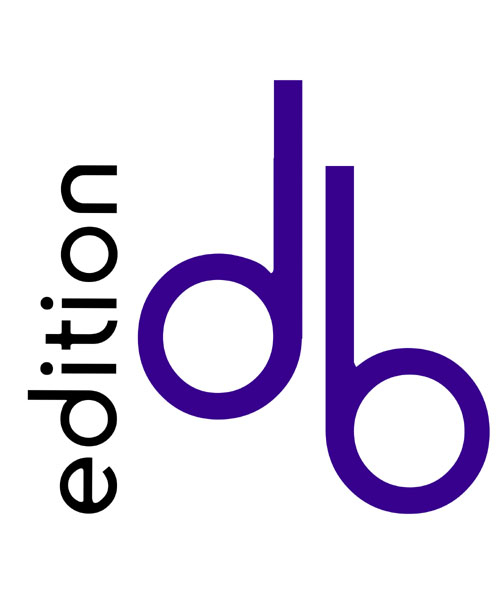
- 7 clarence grove
- horsforth
- leeds, LS18 4LA
- UK
- tel: 0113 258 1300
- order online
- order by fax
- www.editiondb.com
- 0113 258 2556
- info@editiondb.com
Three Poems by Geraint Jones for Tenor, Horn and Piano composed by Anthony Randall
edition db 0703005
In the Spring of 1944, David Rhys Geraint Jones of Haverfordwest, Pembroke, Wales, wrote three poems: “Let me not see old age,” “A joy too deep for words to say,” and “Your peace is bought with mine.” On June 28 of that same year, he died in battle in Normandy at the age of 22. In 2010, according to westerntelegraph.co.uk, UK hornist, professor, conductor and composer Anthony Randall was given a copy of the poems by an aging uncle, and after contacting regional newspapers to publish an appeal to locate Jones’s family, he obtained permission from Jones’s sister to compose these chamber pieces, which he completed later that year. In his appeal, Randall had written, “I was so taken by the poems, I would like to set at least one to music, but won’t do anything about the piece until I know I can have some sort of blessing from the family. The power of the writing is moving, there is a sense of foreboding in theme as well, there is a premonition of death going through the three poems I have. It is very deep.” Randall’s profound appreciation of poetry has been evident in his earlier works for voice, horn, and piano, and all of his recent compositions reviewed in The Horn Call (see October 2007, May 2010, and October 2011) exhibit a masterful and inspired level of musical creativity and integrity.
In each of these movements, which are of four to five minutes duration, the voice, horn, and piano are independent equals engaged in intensely dramatic dialogues wherein they state, respond, reiterate, enhance, emphasize, contradict, and elaborate on motifs and gestures. It is always my sense that Randall’s rhythms and meter changes, as well as his memorable melodies and changing textures, artfully communicate the text without compromising his creative musical ideals. The resulting rhythmic independence of the three partners is relative complex: fortunately, the tenor part provided is a full score with the vocal line formatted in larger print. The range of the tenor part is from eb to a’, and the tessitura is moderate. The demands in the horn part are more modest than those of some of Randall’s other recent art music (as differentiated from his earlier pedagogical compositions), and the piano writing appears idiomatic, well-crafted, and appropriately expressive.
The Three Poems by Geraint Jones may be purchased as a set or individually (by title) as separate works. I believe all of them are important additions to our relatively small repertoire of deeply moving works for voice, horn and piano. Given an apparent prominence of “Let me not see old age” as an unusual eulogy, Randall’s new and meaningful setting may ultimately bring the notion of contemporary art music to some new listeners at times when they may appreciate it most.
Virginia Thompson, The Horn Call, IHS, Vol.XLIII, No.3, October 2012
Three Poems by Geraint Jones for Tenor, Horn and Piano composed by Anthony Randall
edition db 0703005
One associates war poetry more with the Great War, but the Second produced a wealth of fine work, much of which has gained public recognition only relatively recently. David Rhys Geraint Jones’ work is not readily found in anthologies. The quality of these fine settings (approximately 15 minutes of music) by Anthony Randall, whose work has become well known and appreciated among horn players, complements Geraint Jones’ poetry (he was killed in Normandy in 1944, aged twenty two) and show clearly the extent to which he feels they demand exposure.
The young man’s words are pessimistic direct and uncompromisingly foreboding, yet they show him as someone who has lived his short life to the full. The music is tonally straightforward, not dissimilar from most other contemporary trios for voice with horn but emotionally diverse, with the horn sometimes imitating both the varied moods and the rhythmic speech patterns of the singer and elsewhere having more of an independent role. It is sympathetically written for the instrument – not at all unrelenting - and apart from one high B does not go above the occasional A flat and A or low enough to worry a competent player who can tongue reasonably fast and who has a flexible embouchure. Exact tempi are deliberately and wisely not stipulated for each song, and until the settings are very well known to the three players there will be a temptation to take them too steadily as each is worked on. Hard work will be rewarded as the words and music begin to flow naturally. The piano part is, I’m reliably informed, not over difficult. Each performer will need to be of what is sometimes called “Diploma” standard (I suppose it depends which diploma one has been awarded) and will enjoy playing the music immensely. The horn player will initially need to pencil in some piano and vocal cues, and the singer needs a good “ear”. He/she will also take care to complement the voice and be careful to know when to take centre stage. As I say, it is a good part to play. It is of course written for a tenor (the part only once strays down to middle D and once up to high A) but despite the gender identification in the words it would I feel sound equally effective sung by a soprano. This is an overdue and welcome addition to the repertoire.
Julian Baker, The Horn Player, BHS, April 2011